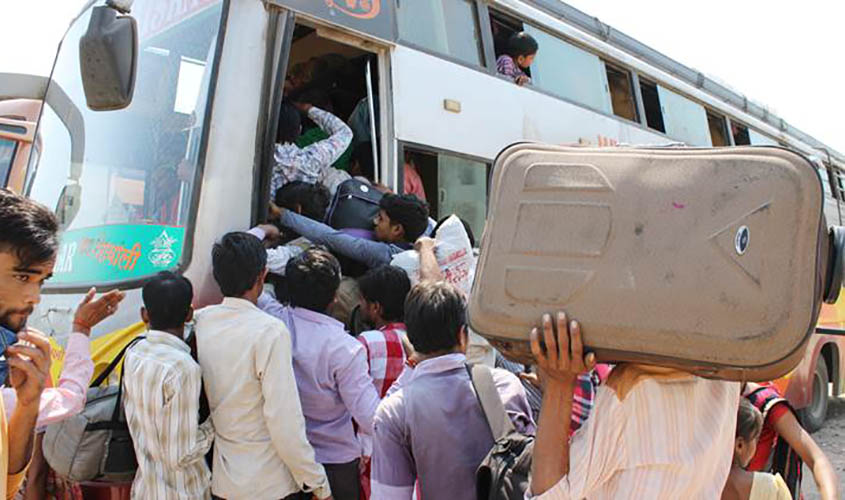The recent attack on Poorvanchalis in Gujarat, forcing many of them to leave the state, to flee back to the safety of their homes in their native areas, could have wide ramifications, both in the forthcoming Assembly polls, as well as the 2019 Parliamentary showdown. Disconcerted and unnerved with the exodus, senior members of the Sangh Parivar have commenced a damage control exercise by assuring community leaders that their security concerns would be adequately addressed with immediacy. The onslaught on labourers from Eastern UP and Bihar took place following an incident where a 14-month-old baby girl was sexually abused by a person from that region. Infuriated by the assault, members of the Thakor caste, unleashed a reign of terror, striking migrants in Ahmedabad, Gandhinagar, Patan, Banaskantha, Aravalli and Sabarkantha.
Although the situation has been brought under control, following the intervention of CM Vijay Rupani, yet fear persists and the labourers are reluctant to return to work. Efforts are on to put in place a mechanism through which the state administration and the political leaders of the affected areas could ensure that retaliatory hate crimes were prevented at all cost.
Bihar CM Nitish Kumar and opposition parties led by Tejashwi Yadav have blamed the BJP for not acting on time to prevent a tirade against the Poorvanchali migrants. The hate incidents are already finding an acoustic resonance in the political theatre of the state, known for its highly political DNA. The fallout of the sudden exodus from Gujarat would certainly impact the polls in Madhya Pradesh, which is an integral part of the Hindi speaking belt. To make matters worse, an attempt has been made to stir anti-North Indian sentiments in Gujarat.
It may be recalled that the Poorvanchalis have been targets of hostility even in adjoining Maharashtra, where both the Shiv Sena and its breakaway group, the MNS, have frequently singled out innocent migrants from UP and Bihar, two of the largest states with huge population, but very little to show in terms of good governance. Electorally speaking, political parties are well aware of the fact that they are a force to reckon with and hence engage in various methods to woo them. The Congress, for instance, had earlier appointed Kripa Shankar Singh, a former minister as the president of the Mumbai Pradesh. Its present chief, Sanjay Nirupam also hails from Poorvanchal. The Sena takes an aim at them since it plays on Maharashtrian emotions blaming the migrants for jobs and employment meant for them.
The UP and Bihar influx into various states has also altered both the demographical as well as political equations. In Punjab, the Poorvanchalis can certainly tilt the scales in favour of whoever they support, in at least two Lok Sabha constituencies, including Ludhiana which has a large workforce from the Indo-Gangetic plains. The so-called hard working Punjabi farmer has virtually become a myth, since most of the expansive agricultural stretches are tilled by the migrants, while the land owners busy themselves in other activities.
In the national capital, there is an extremely strong presence of the Poorvanchalis in the local administration and the police, besides large areas in the Trans-Yamuna and West Delhi belts. The current BJP chief, Manoj Tewari, who is an MP from North East Delhi, recently held a conclave of Poorvanchalis, drawing sharp criticism from traditional party supporters led by Union Minister Vijay Goel—a three-time Lok Sabha MP from Delhi Sadar and Chandni Chowk. Over the years, the city’s politics has been dominated by Punjabis, Banias and rural people including Jats, Gurjars and Ahirs.
However in 1996, the BJP fielded Lal Behari Tewari, a minister in the Madan Lal Khurana government, in a byelection from East Delhi. Tewari not only trounced Ashok Walia and H.K.L. Bhagat, who contested as an Independent after being denied the Congress ticket, but went on to win in 1998 and 1999 as well. Incidentally, in 1998, he defeated Sheila Dikshit. There was no looking back, and when the Congress subsequently fielded Mahabal Mishra from West Delhi in 2009, he won hands down. In the 2014 elections, the AAP garnered a large number of votes in areas where Poorvanchalis resided, and Manoj Tewari was apparently attempting to offset their strongholds without recognising the dissent from within.
Undoubtedly, there is a sociological side to the presence of the Poorvanchalis in states to which they have migrated, a right accorded to every citizen as per the Constitution. Their story is similar to that of Indians, who excel when they work abroad, pointing to the necessity of creating conducive working environment in our own country. People from some of the Hindi speaking states also do much better outside their own regions, which are plagued by intense politics and strong caste biases and prejudices. It is in quest of a better life that they venture out to set up home in other Indian states, though many a times they have to bear the brunt of animosity from the local populace.
The short point is that it is the responsibility of any state government to furnish security to all Indians who wish to live at the place of their choosing. Gujarat is a prosperous state, and has been the home of migrants not only from other regions in India, but also from West Asia and Africa. Needless to say that normalcy must be restored at the earliest. Between us.

